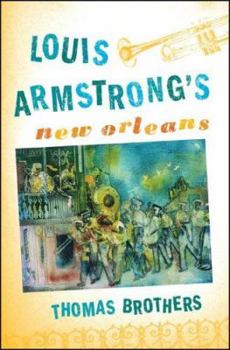Book Overview
Drawing on many accounts, this work tells the rags-to-riches tale of Louis Armstrong's early life and the social and musical forces that shaped him. A tale of a musician, his city and the origins of jazz, it interweaves an account of early 20th-century New Orleans with a narrative of the first 21 years of Armstrong's life.
Format:Hardcover
Language:English
ISBN:0393061094
ISBN13:9780393061093
Release Date:April 2006
Publisher:W. W. Norton & Company
Length:386 Pages
Weight:1.64 lbs.
Dimensions:1.3" x 6.3" x 9.6"
Customer Reviews
2 ratings
A very, very great book
Published by Thriftbooks.com User , 17 years ago
Thomas Brothers has pulled off the near-impossible for a youngish man living in the 21st century. He has managed to dissect and explain most of the complex social and musical interactions in New Orleans as they existed in the years when Louis Armstrong was growing up, coming of age, and learning his way around the horn and the music business. He adroitly explains how the social and cultural climate of New Orleans was exactly right for not only the formation of the music we call jazz, but also how it trickled down from the uptown African-Americans to the downtown Creoles. I only give the book four stars, however, for one reason. Mr. Brothers does not include or describe the jazz music created by Jack "Papa" Laine, Tom Brown and THEIR bands in the further downtown white districts. Laine was leading jazz bands from the mid-1890s on, and his graduates included virtually all the better-known white jazz musicians such as Nick La Rocca, Larry Shields, Eddie Edwards and Alcide "Yellow" Nunez. While it is true that the "Original" Dixieland Jazz Band claimed credit for music that was not their own, the same was true of "blues composer" W.C. Handy, whose wholesale theft of folk material was exposed by Jelly Roll Morton in 1938; of Clarence Williams, who routinely stole songs from everyone (Brothers even blithely credits him with stealing "I Wish That I Could Shimmy Like My Sister Kate" from Armstrong); and of Benjamin and Reb Spikes, who stole songs from EVERYBODY, black, Creole or white. As a matter of fact, the ODJB's original clarinetist, Alcide "Yellow" Nunez, even stole "Livery Stable Blues" from his former bandmates, copyrighting it under his name and that of white bandleader Vincent Lopez! So much for honor among thieves. Despite this oversight, the book is excellent in every respect. Armstrong's development, musically, intellectually and socially, is explained in painstaking detail. (One of my few complaints is that Mr. Brothers overuses the word "hegemony" as much as Gene Santoro overuses th word "zeitgeist.") Very well written, thoroughly researched, and a full explanation of exactly "how" jazz developed, especially in New Orleans, and how this development affected the greatest early jazz soloist of them all. Highly recommended.
Satchmo and the context of New Orleans
Published by Thriftbooks.com User , 18 years ago
It is amazing, beautiful, and triumphant that African Americans, who at the beginning of the 20th-century were mostly despised by the dominant White culture and subject to wanton and homicidal violence in the South, should at the same time have created jazz -- the only original American music and which, in its origins, is essentially happy and upbeat. In Mr. Brothers's superb new book, he examines the reasons for this aspect of jazz, as well as many other aspects. As he says in his introduction to "Louis Armstrong's New Orleans", it is not so much a biography of Satchmo as it is an attempt to place him and jazz in the historical, social, political, and musical contexts into which the man and the music were born. Satchmo was the perfect person in the perfect place at the perfect time. The aftermath of the defeat of Reconstruction and the institution of Jim Crow laws was the impetus for 40,000 ex-slaves to flee the plantations and move to New Orleans. Among their possessions they brought their music. This music and its players fused African rhythms and tonalities with Western instruments. The old plantation bands, which were composed mostly of string instruments, began the tradition of "ragging" the tune; that is, taking the melody, breaking it apart, and riffing on it. When this music arrived in New Orleans, it was translated into wind instruments such as the clarinet and trombone, but especially the cornet. Blues structure also developed at the same time. At the beginning of the 20th century, brass bands were flourishing in New Orleans. Buddy Bolden, a cornetist who played the blues, became the first jazz soloist. The music took off. Into this fecund world, Louis Armstrong was born (1901). The son of a teenage mother and absent father, Louis roamed the streets of New Orleans selling newspapers, carrying the instruments of band players, and getting himself into trouble occasionally. Trouble sent him to school where he got his own instrument and emerged as a cornetist who, at the age of 14, was good enough to be a substitute in bands. By 17 he was renowned in his hometown and by his mid-twenties he had moved to Chicago as part of the Great Migration of Blacks to the north. He had come to Chicago by invitation of his cornet mentor, Joe "King" Oliver. Soon, Satch would be cutting the records -- with his Hot Five and Hot Seven bands -- that first made his reputation and then made him a planetary legend. All of this Mr. Brothers tells in a literate, compulsively readable style. But he brings more to the table. What is crucial in his book is the understanding of the many strands of context so important to a full picture of any artist's achievement. One example: Mr. Brothers highlights how important the cornet was to the origins of jazz in New Orleans because it was a brass instrument that could be played LOUD and with dexterity. In fact, everybody who remembered Buddy Bolden remarked on the fact that he played loudly (Bolden went insane around






